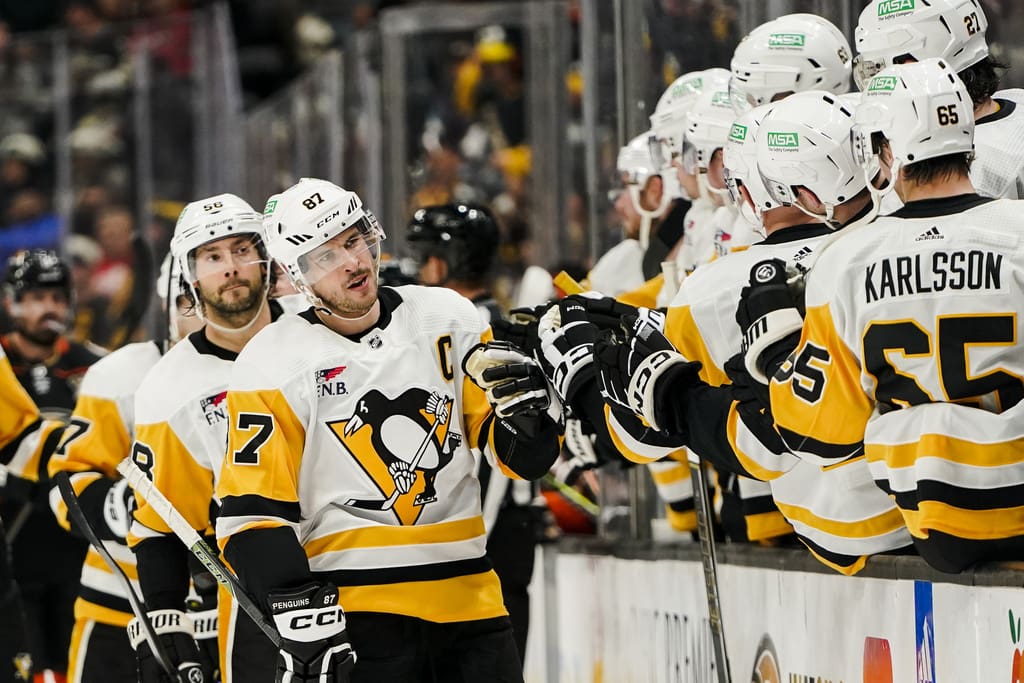Penguins
Penguins Analysis: One Big Takeaway from Trip, but will Pens Admit it?

Three games in California. Three wins. The Pittsburgh Penguins rolled through the West Coast road trip, winning three games in three very different ways. They lost their starting goalie, got a stellar performance from their third goalie, and scored two overtime goals in one game.
It was a much-needed roadie for a team that boarded a plane in Pittsburgh at 3-6-0 and returned 6-6-0, four points out of a playoff spot but with two games in hand on teams such as the Toronto Maple Leafs, who are increasingly, not decreasingly, struggling.
However, it’s one thing to rally, it’s another to pull ahead.
There were a few things to really like about the Penguins’ game in the Pacific time zone, but against LA, their warts were on display, too.
The first thing confirmed was goaltending needs. When the Penguins get competent goaltending, as they did in all three games (five periods by Tristan Jarry and four-plus periods by Magnus Hellberg), they’re a pretty good team.
You can also file that observation under D for Duh.
The Penguins beat the Anaheim Ducks, who were on a six-game winning streak, and the LA Kings, who are among the Western Conference elite.
Those were good wins.
In those wins lies the key to the Penguins season. When the team is structured, perhaps a little bit conservative, the team is very good. Anaheim can score goals in a few different ways, but they are a quick, talented team. The Penguins religiously kept the third forward high in the zone rather than chasing the forecheck.
As part of that strategy, the Penguins’ 1-2-2 structure created a second layer of defense through the neutral zone once Anaheim passed the initial forecheck.
The result? A 2-0 win in which the Penguins were always in control. They led only 1-0 until Sidney Crosby scored a ridiculous backhand goal from center ice into an empty net, but the game was never in doubt.
And therein lies the biggest takeaway from the Penguins road trip. The Penguins are better when they’re not trying to outskate or be too aggressive. They’re better when they’re structured, perhaps a little bit conservative, and patient.
The Penguins were decidedly impatient against the LA Kings, and they flirted with disaster. Far too many times during that game, not only was the third forward caught low, but so too was a defenseman.
Defenseman Ryan Graves currently has a case of Penguins-itis, a condition which was first discovered nearly 40 years ago. There won’t be any telethons, but the condition affects defensive players who arrive in Pittsburgh and try to play a more offensive game.
An unhealthy number of his pinches have been both unfruitful and potentially harmful.
Erik Karlsson was brought to Pittsburgh to generate offense, but he, too, was impatient and overly aggressive against the Kings. The results fed the LA transition game.
The Penguins earned their win over LA, but they did not play a clean game. Rather than the structured game, they overcommitted in the offensive zone and then raced back to pack the interior of the offensive zone.
They were not in control of the game against LA. A bad bounce or soft goal, and they probably lose.
They were outshot 37-20 and yielded significantly more scoring chances (though they were about even in high-danger scoring chances, according to NaturalStatTrick.com).
Yet the rub for the Penguins seems to be accepting their situation. A team that set the standard with speed and aggressive forechecks is now merely one of many teams with what was once considered superior speed. Except for the result, even coach Mike Sullivan seemed to prefer the Penguins’ aggressive attack in the first game against Anaheim, a 4-3 loss, to the 2-0 win.
“I thought the game we played in Pittsburgh — actually, we controlled a lot more of the game … and I thought tonight was a more evenly matched game. There were some chances on both sides, but there wasn’t a lot of room up there,” Sullivan said on Tuesday after the win in Anaheim.
In five years of doing this job every day (and a couple of years on the radio prior to that), it was the first time I was taken aback by Sullivan’s take on his team.
The crux of the disagreement is perhaps the team’s optimism pitted against what I see as a reality of the roster. As the coach, Sullivan likely believes the repeated overaggressive mistakes can be fixed, that Karlsson will adjust, the turnovers will decrease, and more players will remain responsible.
The view here is — what Marcus Pettersson termed as “kind of losing our head” — will continue because that’s the natural tendency of the totality of the roster.
And so it seems we may be set up for the push and pull of the Penguins’ season. It will be their best game against their desires and natural tendencies.
And that’s the biggest takeaway from the Penguins trip.












